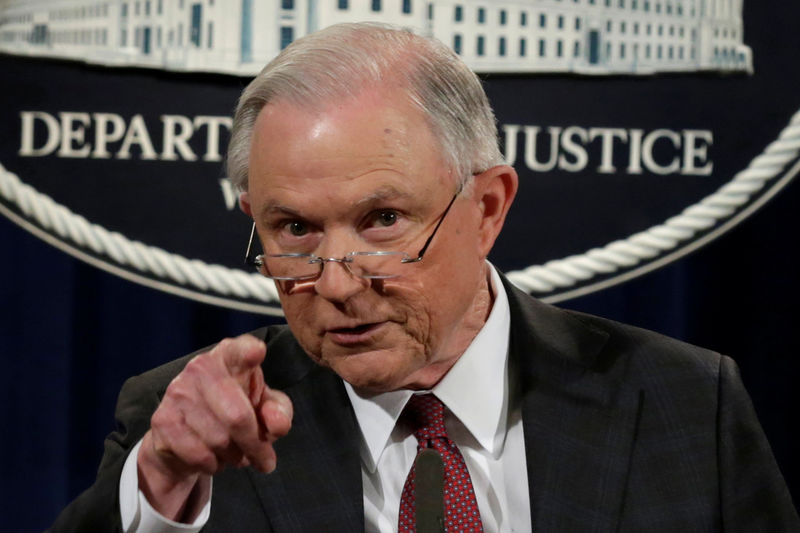By Susan Heavey and Emily Stephenson
WASHINGTON (Reuters) - U.S. Attorney General Jeff Sessions will reply in writing to Senate Democrats' questions about his meetings with Russia's ambassador last year, the Justice Department said on Friday after a top Republican denied Democrats' request for a public hearing.
Nine Democratic senators sent a letter earlier Friday asking Judiciary Committee Chairman Chuck Grassley to call Sessions before his panel to explain his failure until this week to disclose his contacts with the Russian ambassador during the 2016 presidential campaign.
The letter came a day after Sessions, the country's top justice official and a key ally of Republican President Donald Trump, removed himself from any investigation into alleged Russian meddling in the election.
Grassley replied that he had no plans for a hearing.
Instead, Sessions on Monday will submit written answers to questions posed in the Democratic lawmakers' letter, such as why he did not come forward sooner to detail his communications with Russian Ambassador Sergei Kislyak, Justice Department spokesman Peter Carr said.
On Thursday, Sessions said he met Kislyak in his Senate office two months before the election as well as at an event with other ambassadors at the Republican National Convention.
During the Senate confirmation process to become attorney general, Sessions denied having any contact with Russian officials during the campaign.
Sessions told reporters he had done nothing wrong by failing to disclose the contact with Kislyak. The Washington Post first disclosed the meetings on Wednesday.
Many Democrats, who are pushing for a broad probe of ties between Trump campaign associates and Russian operatives, called for Sessions to resign.
Trump, however, has backed his attorney general and accused Democrats of blowing the issue out of proportion for political purposes.
On Friday, he accused Chuck Schumer, the top Democrat in the Senate, of double standards for having met Russian President Vladimir Putin himself.
"We should start an immediate investigation into @SenSchumer and his ties to Russia and Putin. A total hypocrite!" Trump said in a tweet that included what appeared to be an old picture of Schumer and Putin smiling as they ate donuts.
Schumer, who has called for Sessions' resignation, responded in a tweet that he was willing to swear under oath that his contact with Putin and the Russian leader's associates occurred in 2003 and in public with the media present.
'WITCH HUNT'
Two U.S. officials, speaking on condition of anonymity on Thursday, said Sessions was one of many subjects of a government investigation of any contacts between the Trump campaign and Russia.
While there is nothing legally wrong with such meetings, the reported contacts raise questions about the White House's statements that it knew of no further communications with Russian officials beyond those by ex-national security adviser Michael Flynn, who was fired last month.
The Russia controversy has dogged the early days of the Trump administration and threatens to obscure its push to cut taxes, repeal the Obamacare healthcare law and deal with other top domestic priorities.
Democratic senators including Dianne Feinstein and Richard Blumenthal said in their letter that Sessions' decision to step back from campaign-related investigations was welcome. But they said his previous answers to questions about Russia were "incomplete and misleading."
"Given the seriousness of this matter, we do not believe that a written submission to correct the record is sufficient," they said in the letter.
U.S. intelligence agencies concluded last year that Russia hacked and leaked Democratic emails during the election campaign as part of an effort to tilt the vote in Trump's favor. The Kremlin has denied the allegations.
On Friday, Russian Foreign Minister Sergei Lavrov said the controversy looked like "a witch hunt," the RIA news agency reported.
Trump called frequently during his campaign for improved relations with Russia, which have been deeply strained in recent years over Moscow's military interference in Ukraine, its support for President Bashar al-Assad in Syria and Putin's intolerance of political dissent.

With his administration on the defensive over Russia, Trump's enthusiasm seems to have cooled, and his top foreign policy advisers have begun talking tougher about Moscow.